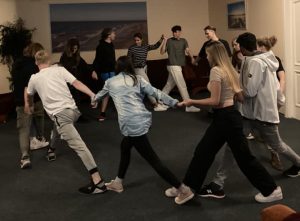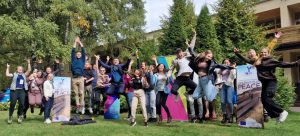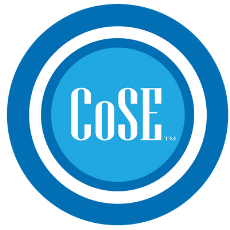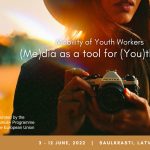Erasmus+ Erasmus Plus Peace
Project Reference: 2021-2-LV02-KA153-YOU-000039218
Erasmus plus Peace (EPP) is a training course that was implemented in Saulkrasti, Latvia during the period of 12-20 June, 2022. The training course was aimed to bring together 28 youth workers from 5 countries who are actively engaged in their local youth organization and who strongly promote intercultural awareness and tolerance, as fundamental principles of peace in our modern, multi-cultural European societies.Erasmus plus Peace project aimed to distribute intercultural learning and with tolerance and peace building, share the best practices of peaceful, non-violent public actions in order to raise the quality of youth work.

The participants involved in the project are working on the daily basis with the multi-ethnical groups of youngsters with social disadvantages in their home countries. As an inherent part of the project participants will have the opportunity to practice non-formal education, as well as define the gender concept. Experiential Learning will be the main method used through the whole project. During TC participants will go through the experiential learning cycle (Concrete Experience → Reflective Observation → Abstract Conceptualisation → Active Experimentation) in order to experience the process of working with the international group of people in practice. The TC also intended to create a strong multiplier effect, as the participants are the ones working with the youngsters and socially disabled, who can imply the knowledge gained during the project in their daily work.
Impact
Local level:
At local level we expected to increase communication between youth workers, partner organisations and non-formal educational institutions, will be increased communication between dissimilar followers in order to ensure qualitative results, and will increase the involvement of young people of different nationalities interested in youth organisations and youth work. They’ve increased their awareness on the importance of Human rights, Inclusion, Cultural dialogue, Multiculturalism, Tolerance, Peace-building, Public activism, Youth work as a tool used by non-profit organisations and youngsters to resolve societal problems, to empower youth and to reduce the issue of youth unemployment.
Regional level:
We have spread the good practices in working with local communities and international partners, our pattern in good practices was used by all the organisations working with different communities and international projects. All partners had the task to sent e-mails to several other organisations from their countries, in order to share the results of the project and develop similar projects together, for the benefit of their communities. Due to the visibility and dissemination plan, more organisations from the participating countries followed our example of good practices and have developed similar projects, targeting even more youngsters from rural areas.
European level:
We have promoted the Idea of development of youth work related to topics of Human rights, Inclusion, Cultural dialogue, Multiculturalism, Tolerance, Peace-building, Public activism, Youth work at European level. Participants from 6 countries living and working together develop solidarity and tolerance and during the fieldwork they entered the interculturality. The home group meetings helped them to reflect on this experience and work with it afterwards. Both locals and international participants will be aware of the usage of the tools and its positive effects.
Primary objectives for this project were the following:
- to raise awareness on the topic of intercultural communication;
- to share knowledge and skills in the field of conducting negotiations in different cultural environments, both on local and European levels;
- to explore effective ways of conflict resolution in the field of cultural exclusion and enabling participants to make right decisions;
- to promote active participation of youth in civil society;
- to develop the awareness of the need for effective dialogue and multiculturalism;
- to introduce the participants to peace building concepts, the importance of non-violent actions against conflicts;
- to develop positive attitude of the participants towards non formal education, equipping them with the knowledge of preparation of activities, peace building activities etc;
- to create new tools of learning by doing during both training course;
- to share best practices and lessons learned in Non-Violence action field.
The impact of these future programs, as well as the transmission of knowledge and experiences acquired during the TC’s to other young peace builders and to the local youth in general are expected to multiply the outcomes of the training course, beyond the group of direct beneficiaries. Partner organisations included;
- ASOCIACIJA TAVO EUROPA
- 2Europia
- Active Youth for Europe
- Idea For Life
- Circle of Sustainable Europe





